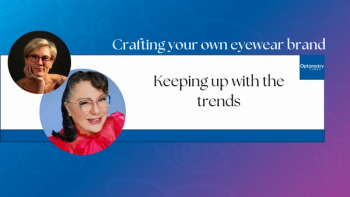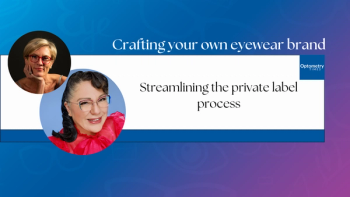
Blog: Mission statement is key to a successful practice
The views expressed here belong to the author. They do not necessarily represent the views of Optometry Times or UBM.
A mission statement declares why a company exists.
While having one may sound old-fashioned and no longer relevant for use today, time has shown that a mission statement can be the key ingredient necessary for a company’s success.
Why do you want to be profitable?
What’s the first answer that pops in your head when asking this question-to support your family? Afford nice things? For job security?
These might be honest answers, but do they motivate you to work each day? Is that why you became an optometrist?
Maybe for some of you the answer is a definite “yes.”
But if your gut is telling you to dig deeper, then keep reading.
Answer the “why”
Recently I attended Essilor’s CEO.D. Program in Dallas. This program uses the original Management and Business Academy (MBA) content as the foundation for its criteria, which empowers optometrists to grow their business.
One of the first tasks participants learned in the training program was to establish a mission statement for their offices.
For example, Essilor’s mission statement is, “
At a later session, the doctors were asked, “Why do you want to be profitable?” None answered the question correctly. Instead, we focused on the result of making profit: keeping the practice afloat, paying off debt.
The correct response is to answer the “why” and plug in the mission statement. In the case of Essilor, the reason why the company wants to be profitable is because they want to improve lives by improving sight.
A new perspective
When eyecare professionals use the mission statement as their guide in how they care for patients, it can change their entire perspective.
We have all been in situations where patients say from the very beginning that they can’t afford much and want only what the insurance covers. Yet, their chief complaint is that they want to see better at night but can’t because of glare problems.
So do you stop yourself from telling patients that anti-glare protection will help them seeing better at night because you don’t want to risk upsetting them about the extra cost?
It’s always best to allow patients to make an informed decision. Recall the mission statement and ask yourself: How will you improve patients’ lives by withholding information that could help them?
By using the mission statement to guide your decisions, you will always have the patient’s well being as first priority.
Do mission statements matter?
If you want your business to grow and be successful, then mission statements most definitely matter.
As Len Sherman highlighted in a Forbes article, companies that became successful lost their momentum due to leadership changes.
These companies were revived only when their previous leaders returned. The solution: Finding a purpose for the company to motivate staff and restore the connection with consumers.
Establishing a mission statement for your practice provides a purpose that will strengthen company morale, create a positive work environment, inspire better work performance, and improve patient care.
However, this doesn’t happen by chance. It all starts with a leader willing to take the first step and provide a purpose for the organization that resonates with both patients and employees.
References:
1. ECPU. CEO.D. Program. Available at: https://ecpu.com/ceod/. Accessed on 1/24/19.
2. Sherman L. Corporate mission statements don’t really matter, unless you want to be a great leader. Forbes. Available at: https://www.forbes.com/sites/lensherman/2017/04/03/corporate-mission-statements-dont-really-matter-unless-you-want-to-be-a-great-leader/#55eff2112246. Accessed 1/24/19.
Newsletter
Want more insights like this? Subscribe to Optometry Times and get clinical pearls and practice tips delivered straight to your inbox.









































